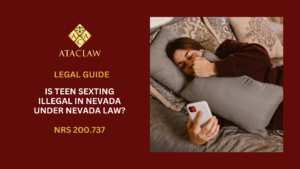In this blog, we aim to clarify Nevada’s legal stance as outlined in NRS 200.737 and discuss the implications for minors involved in sexting. NRS 200.737 is a law implemented by the state of Nevada to address the issue of sexting among minors. Under this statute, it is unlawful for any minor (individuals under 18 years old) to knowingly use any electronic communication device to send or distribute sexually explicit images of themselves or others.

What Are the Legal Implications of Teen Sexting in Nevada?
Nevada’s legislation, NRS 200.737, clearly outlines that it is against the law for minors to engage in sexting activities. This law strictly prohibits minors from utilizing any form of electronic communication to share or receive sexually explicit images of themselves or of other minors who may be of the same age, older, or up to four years younger.
Prior to the establishment of NRS 200.737 in 2011, the legal system treated teen sexting cases under the stringent child pornography laws of Nevada. This approach provided limited flexibility for prosecutors, forcing them to apply the same harsh penalties designated for adults involved in the creation and distribution of child pornography.
Understanding the Prohibitions:
Under NRS 200.737, three main actions are identified as illegal for minors:
- Sending Self-Images: It is illegal for a minor to send or share sexually explicit images of themselves using any device capable of electronic communication.
- Sharing Images of Peers: Minors are also prohibited from transmitting sexually explicit images of other minors, irrespective of whether those peers are the same age, older, or up to four years younger than the sender.
- Possessing Received Images: Possession of sexually explicit images received through such transmissions is also illegal, especially if the subject of the image is within the specified age range in relation to the holder of the image.
The enactment of NRS 200.737 represented a significant shift in the legal approach to teen sexting in Nevada. By introducing this law, lawmakers aimed to provide a more appropriate legal framework that distinguishes between the actions of minors engaging in sexting from those of adults involved in more serious offenses under child pornography laws. This distinction recognizes the need for a differentiated response that addresses the unique aspects of teen sexting without the extreme consequences tied to child pornography charges.
What Are the Legal Consequences for Teen Sexting in Nevada?
Initial Offenses and Penalties
For teens taking the step to share sexually explicit images of themselves for the first time, or in instances where they possess similar images of peers, the act falls outside the realm of criminality. Instead, such actions can lead to being designated as a “child in need of supervision” by the Nevada Division of Child and Family Services.
This designation is not without consequences, as it may entail obligations such as undertaking community service or paying fines. Importantly, this status avoids the more severe label of “delinquent child,” sparing the individual from the implications tied to juvenile sex offender registration or community notification.
Escalating to Delinquent Acts
The legal landscape shifts decidedly when:
- A teen is found to have repeatedly engaged in sexting, specifically sharing images of themselves beyond the first offense.
- Any act involves the sharing or transmitting of sexual images of another minor, regardless of the frequency.
Such behaviors elevate the situation to what is legally termed a “delinquent act,” paralleling the severity of a misdemeanor. As a consequence, courts possess the authority to place the teen in juvenile detention for up to six months. Facilities like the Clark County Juvenile Detention Center in Las Vegas serve as potential places for detention under these circumstances.
Despite the gravity associated with “delinquent acts,” teens found in violation will not be classified as sex offenders. This means they are spared from the onerous requirements of sex offender registration or engaging in community notification as a juvenile sex offender.
What Defenses Can Be Used Against Teen Sexting Charges in Nevada?
In Nevada, facing charges related to teen sexting does not necessarily mean there’s no recourse. Several defenses are available that could potentially mitigate the situation or even result in the dismissal of charges. Below are some of the common defenses, though this is not an exhaustive list:
- Unawareness: Claiming you were unaware of the presence of the image on your device.
- Lack of Intent: Arguing that you had no intention to disseminate the image.
- Absence of Direct Involvement: Asserting that you were not the individual who captured or distributed the photograph.
- Age of the Individual: Stating that the depicted person was not actually a minor.
- Age Gap: Highlighting that the individual in the photograph was more than four years younger than you, which can affect the applicability of certain laws.
- Proactive Measures: Demonstrating that you did not solicit the image, never shared it, and took swift actions either by deleting it or by reporting it to authorities or school officials.
Harnessing these defenses requires a nuanced understanding of Nevada’s legal framework surrounding teen sexting offenses. It’s imperative to tackle these charges with the assistance of legal counsel who can navigate the complexities of the law, ensuring that teens and their families explore every available defense strategy. Consulting with a professional early can significantly alter the outcome, potentially safeguarding the future of the involved teen.
For families and minors facing challenges related to sexting, acquiring knowledgeable legal advice is essential. Early legal intervention can greatly influence the outcome of such cases, emphasizing the importance of awareness and education concerning the legal implications of teen sexting in Nevada.
For further legal assistance and to discuss your case with an expert, don’t hesitate to contact ATAC LAW.
